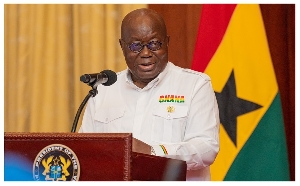Business News of Monday, 25 August 2014
Source: BFT
Nigeria gas persistently erratic
Gas supply from Nigeria has fallen to 50 million cubic feet from around 80 million six months ago, in what has become a persistent trend of erratic supply that drives home the urgency of bringing on-stream the country’s own gas.
The new volume is 70 million cubic feet (58 percent) short of the expected 120 million contractual volume. The development has meant the largest power producer, Volta River Authority (VRA), has to spend US$55million every three weeks to import crude oil to power its thermal plants.
Many questions have been raised about why the country continues to rely on gas from Nigeria and what can be done to prevent NGas, the main supplier of the commodity, from continually reneging on the agreed volume.
The questions have become more pressing especially as electricity generation from hydro sources is currently at risk from poor inflows of water into the Akosombo, Kpong and Bui dams.
NGas’s shareholders are made up of Chevron, Shell and the Nigerian National Petroleum Corporation (NNPC).
Kofi Ellis, Business Development Manager of the VRA, explained to the B&FT that Nigeria’s domestic gas demand currently outstrips production, making it difficult for NGas to supply the full contractual volume to Ghana.
“The level we get now is about 50 million. Total demand in Nigeria is about 1.6 billion standard cubic feet of gas, and the production is about one billion. So ideally, you would say Nigeria should not even put any gas in for Ghana because it’s not enough for them. But they are doing something to increase production to two billion by 2015, and the idea is that when they are able to improve it to two billion there will be enough for the domestic market. Because our price is much better than the domestic market, they will definitely put full gas in the pipeline for us at that stage. As it stands, they are only trying to help us.”
He said the price of gas is half the price of crude oil for an equivalent amount of electricity generation, and that “the idea of Ghana gas is purely to try and reduce our cost of production by bringing VRA’s plants from crude production to gas production.”
He also touched on the issue of compensation from the Nigerians due to their inability to supply the volume specified in the 20-year contract.
“The contract says that if you don’t give me gas, you have to pay to enable me buy crude oil for the shortfall. But this contract was signed more than 10 years ago when the crude oil price was below US$20/barrel. At the time of negotiating the contract, we agreed that because we didn’t know what the future price of crude oil would be, we would price it at a default rate of US$35/barrel. We expected that within the contract period, even if the price of crude oil doubled, it would fall within that price range.
“Now the crude oil price has jumped from that low level to more than US$100/barrel. Using the US$35 price, compensation for the entire contract period came to about US$20million. They’ve paid us US$10million already. So what is left is US$10million for the remainder of the contract period,” he said.
The country’s current gas demand is about 300million standard cubic feet. The imminent completion of the Atuabo pipeline linked to the Jubilee oil field is expected to bring on-stream at least 120million standard cubic feet of gas. Given the unreliability of Nigeria’s gas, a supply volume of 80 million from them would still leave a deficit of some 100 million cubic feet.
Over the long-term (2014-2021), the VRA projects electricity demand to grow at an average of 10 percent annually, rising from 1,950MW to 3,300MW in 2021.
The VRA has therefore started negotiations with other gas suppliers in Nigeria for the supply of additional gas via the West Africa Gas Pipeline. The pipeline is designed to carry up to 200 million cubic feet of the fuel.
Entertainment










